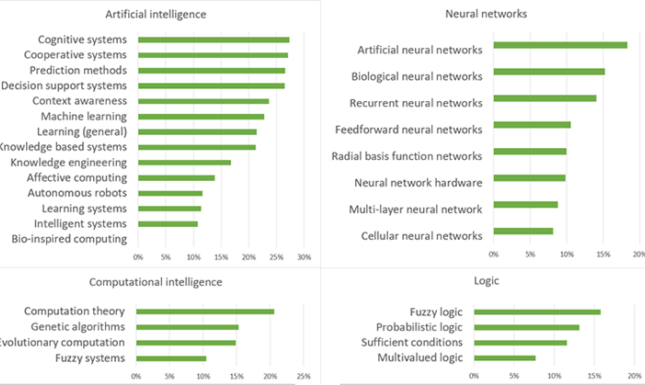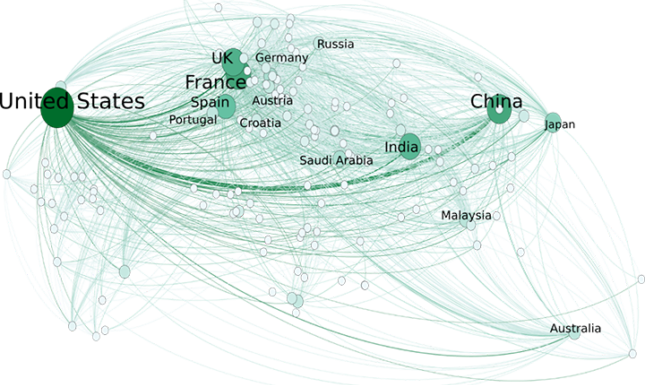The disconnection between artificial intelligence engineering research and sustainable development
Artificial intelligence (AI) has the potential to contribute to solving some of the most pressing societal issues of our time, but to what extent are engineers reflecting on the uses of their technologies for sustainable development, and who is producing the engineering knowledge behind AI?
We are witnessing a vertiginous global technological development, but this development is not paralleled with a growing improvement in the sustainable development of the planet. For instance, next-generation computing, air transport, energy production, and more recently the development of 5G technologies, cryptocurrencies - among others - enhance human capacity in certain directions but limit it in others: they increase our dependence on non-renewable sources and increase the inequalities between countries that provide such resources and countries that develop these technologies. If we do not connect our technological development with global priorities – such as the UN Sustainable Development Goals (SDGs), how can we preserve the future of humans and other beings on the planet?
In our study, we evaluate the relationship between published engineering research and sustainable development and focus on two key points that are getting little attention:
- A large extent of AI engineering research papers do not incorporate sustainability goals in their reflections on the development of technology.
- The extent to which countries have the ability to produce new knowledge on AI, which we refer to as AI engineering research capabilities, are being increasingly concentrated on powerful countries, leaving the scientifically marginalized countries with little room to define the directions of AI and assess the implications of AI research.
In this blog post, we show our findings that support these observations.
On the first point, given that technologies can be used in different ways and that academia is one of the main engines for their development, it is necessary for academia to motivate critical thinking and reflect on the potential uses of technologies. However, we found that sustainable development issues are little addressed in global engineering research, specifically in artificial intelligence We found that it is not common to find researchers' reflections on the impact of their inventions on the planet in AI publications, as well as their potential uses to achieve the SDGs by 2030. Out of 220,000 engineering articles indexed by IEEE Xplore on AI published from 2000 to 2020, only 8% to 30% approximately -depending on the engineering discipline- discuss issues related to their contribution to sustainable development.
Those disciplines that discuss sustainable development in more than 20% of their production focus on cognitive and cooperative systems, prediction methods, decision support systems, and computation theory. Other disciplines, such as learning systems, bio-inspired computing, and autonomous robots, which are crucial for sustainable development, discuss it to a much lesser extent (see figure 1).
While it can be argued that entrepreneurs and other parties will find applications of these technologies to sustainable development, scholars such as Yuval Noah-Harari have warned that what drives the development of AI is not an ambition to solve our main societal issues, but rather increasing profits and surveillance of the population. We contend, then, that at a time of planetary crisis we need more awareness and commitment of engineers to help envision applications for solving the major challenges of our time. Not engaging in the potential uses of technologies poses a risk of a disconnection between AI engineering research and these societal issues, leaving the development of these technologies to the forces of the market and state control.

On the second point, we found a disproportionate concentration of AI engineering research capabilities in a few dominant countries. This means that in terms of power, AI research follows the traditional pattern of most technological developments, which is increasing the already huge technological gap between “centers” and “peripheries”. The following figure shows the global co-authorship patterns of AI engineering research, in which most countries involved are traditional scientific powers while the rest seem to play a very minor role.

* Nodes positions attempt to preserve the location of countries in the Mercator projection of the world map. Size and color indicate betweenness centrality; only countries in the top 10 percentile by betweenness centrality are highlighted.
If this trend of concentration of engineering research capabilities – the extent to which countries can produce new knowledge - continues, how can it be ensured that all countries have a voice and can act on the development of AI technologies? Additionally, to successfully regulate these technologies, research capabilities are pivotal. Lacking such capabilities means that potential regulations, such as limitations to data collection, manipulation, and algorithm biases, may not be ensured because of a lack of infrastructure to reproduce research results and technologies, and a lack of local expertise to audit them.
A hopeful finding in our article is that sustainable development is increasingly being discussed in certain AI-related engineering disciplines. We identified Broadcast technology, Systems Engineering and Theory, Ultrasonics, Ferroelectrics, and Frequency Control, Sensors, and Education. Specifically on AI subjects, we found emerging discussions of sustainable development in Recurrent neural Networks, Prediction Methods, Computation Theory, Learning Systems, and Machine learning. We believe building on these emerging interests can help to educate engineers that are more concerned with their natural and social environment.
However, to foster the relevance of AI research for sustainable development, capabilities need to be built in those countries that have traditionally been marginalized. A decisive and generous approach to international collaboration and knowledge exchange needs to be supported and fostered by multilateral organizations such as the OECD and the United Nations if contribution of AI research for sustainable development -leaving no one behind- is to be achieved.
Given that power is in the hands of a few countries, coordinated programs and funding in regions such as Latin America and South Saharan Africa need to be developed and maintained over the long-term if these regions want to exert real influence on the global AI agenda, rather than being mere subordinated consumers of AI.
Photo by @DeepMind




0 Comments
Add a comment